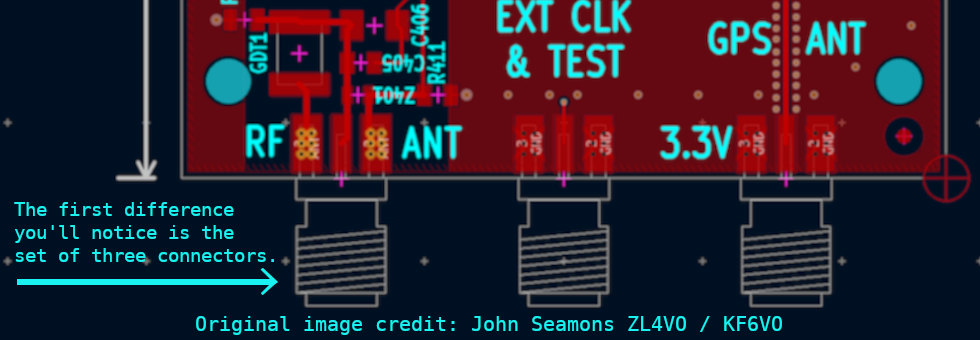It is with great joy and anticipation that I make note of an announcement from John Seamons, callsigns ZL4VO / KF6VO, that the KiwiSDR project has been upgraded to KiwiSDR 2. Specifications are not finalized, but Seamons did state that incremental improvements are coming to the radio. It will have a more robust production process, without the problematic component sourcing which caused interruptions in the original KiwiSDR's manufacturing. The KiwiSDR 2 will have physical dimensions matching the original version and will fit in the same enclosures. Here are more differences:
Input Coupling and Lightning Protection
- Balanced antenna input via balun transformer
- Digital attenuator: 0 - 31.5 dB in 0.5 dB steps
- Gas discharge tubes across the input
- Transient voltage suppression(TVS) diodes across the input
- Static drain resistors (100K) from input connections to ground
Those are prudent changes for the KiwiSDR 2. I am happy to see some attention given to protection from both static buildup and lightning induced transients. Certainly, no radio system will survive a direct lightnig strike on the antenna, feedlines, or other attached conductors. However, a well designed station should not be rendered inoperative due to lightning strikes in the vicinity. Good for the KiwiSDR 2 to have multiple layers of protection.
Common mode noise plagues a lot of receiver setups. Filtering it is one of those aspects of station building which does not get enough attention, and I am glad to see the KiwiSDR 2 use a balanced input. It will stop a lot of common mode noise. There are multiple ways that it can get into a radio, though, so operators should learn more about common mode noise and suppress it in your stations. You'll notice the difference and be glad you did it!

External ADC Clock Made Easier
- External ADC clock connectable on a third SMA connector
- Self test loopback is possible by passing clock signal to the antenna input
Other Changes
- New GNSS chip replaces old one which was becoming unavailable
- Reverse polarity power protection on 5V power input
The coming KiwiSDR 2 is good to see. I was rather unhappy to see earlier reports that the project was having difficulty obtaining electronic components during the chip shortage, and that it was going to end. There is plenty of demand for a high performance, highly configurable, networkable SDR for the bands at 30 MHz and below. None of the alternatives have similar performance or user experience.
With a grin, I will close this posting with an apt quote from the eleventh chapter of my book, "KiwiSDR: 21st Century Radio for the People":
As to the specific future of the KiwiSDR, look at today’s units
and expect incremental refinements to software and the BeagleBone
host. It will get better, but it will still be the KiwiSDR which
we enjoy so much.
Seamons went for the low hanging fruit, avoiding added complexity and expense which comes from radical redesigns. It is already a great receiver; all it really needs is for that low hanging fruit to be picked.
© 2005 - 2026 AB9IL.net, All Rights Reserved.
Written and curated by Philip Collier / AB9IL.
About Philip Collier / AB9IL, Commentaries and Op-Eds, Contact, Privacy Policy and Disclosures, XML Sitemap.